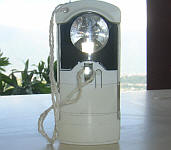Flattery…
Character vs. Reputation
Lunar Letter / Bonito o Práctico
 ¿Qué es mejor lo bonito y bello o lo práctico y útil?
¿Qué es mejor lo bonito y bello o lo práctico y útil?
Como muchos, yo he pensado que he tenido la respuesta “definitiva” en cuanto a que es mejor. Aún así, ahora comprendo que aquello que es “correcto” para una persona puede ser “incorrecto” para otra.
Hace unos días necesitaba una linterna y como suele pasar encontré varias linternas en casa y ninguna funcionaba. Pregunté a mi hija mayor si tenía una y me dijo, “Por supuesto, ¡tengo la que me arreglaste hace tiempo!” Cuando me dio la linterna reí porque se trataba de la linterna que había “recuperado”
La linterna fue comprada en Parque de la Costa en Buenos Aires y realmente era más como juguete que cualquier otra cosa. Sin embargo, la linterna había sido fiel y cuando más la necesitábamos, allí estaba. Un día hace unos años se cayó y no prendió. A pesar de mi tristeza por haber perdido una “amiga” fiel, intenté arreglarla.
Logré que funcionara quitando la tapa, colocando una tuerca que se mete en un hueco para prenderla y atando la tuerca con un pabilo al casco de la linterna para que no se perdiera. Coloqué cinta adhesiva alrededor de la linterna para que no se le cayeran las pilas. Aunque no es nada bonita, ¡es muy funcional!
Cuento toda esta historia porque cuando alguien ve mi “super-linterna,” se ríe de lo que hice. Hay muchas personas que ¡en una situación parecida hubiesen botado la linterna inmediatamente!
 Siento que lo práctico es mejor que lo bonito y para mi ha funcionado. A la vez para una persona que está más enfocada en lo estético, prefiere no utilizar algo feo aunque funcione. Los que somos más “prácticos” y no tan enfocados en lo “bonito” pensamos que tenemos la razón.
Siento que lo práctico es mejor que lo bonito y para mi ha funcionado. A la vez para una persona que está más enfocada en lo estético, prefiere no utilizar algo feo aunque funcione. Los que somos más “prácticos” y no tan enfocados en lo “bonito” pensamos que tenemos la razón.
Me doy cuenta ahora que no hay una respuesta correcta en todos los casos. Es decir, para una persona que prefiere lo práctico lo más importante es que esto funcione. Para los que prefieren lo estético, la apariencia mata la función.
 Lo que hace la vida más placentera es que todos somos diferentes. Todos tenemos una forma distinta de pensar y actuar. ¡Imagínate lo aburrido que sería si todos fuéramos iguales!
Lo que hace la vida más placentera es que todos somos diferentes. Todos tenemos una forma distinta de pensar y actuar. ¡Imagínate lo aburrido que sería si todos fuéramos iguales!
Sin embargo, muchas veces tenemos poca tolerancia para los que piensan diferentes que nosotros. En su libro Los Cuatro Acuerdos, Miguel Ruiz elabora un modelo que viene de Los Toltecas de México. El explica que todos tenemos una serie de “mitotes” o creencias que han sido inculcados desde nuestra juventud. Mientras que algunas de estas creencias que son válidas, muchos no las son. De hecho, la gran mayoría de lo que hacemos es en función de complacer a los demás y no necesariamente lo que nos beneficia personalmente.
Como todos somos diferentes y todos tenemos una forma distinta de pensar y actuar, ¿Por qué pensamos que siempre tenemos la razón? Mi gran amigo Francisco Novoa suele preguntar, “¿Qué prefieres, ser feliz o tener la razón?”
Podemos evitar un desgaste increíble de energía y eliminar mucha frustración simplemente aceptando a los demás como son y con su forma de pensar. Todos actuamos en base a nuestra propia “verdad” de la vida. Todo lo que decimos y todo lo que hacemos está basado en nuestra creencia que para nosotros es verdad.
En vez de tratar de convencer a los demás que siempre “tenemos la razón,” podemos simplemente aceptar lo que dicen y luego plantear nuestro punto de vista sin necesidad de convencerles que tenemos la razón. La vida está hecha de momentos. Desperdiciar tiempo intentando de convencer a los demás que están errados suele ser un ejercicio de futilidad. Cuando aceptamos a los demás como son, con todos sus defectos y limitaciones, ¡abrimos las puertas a la felicidad!
∞ Rob McBride ∞
LL II 3
Lunar Letter / Pretty or Practical
 What is better something pretty or something practical?
What is better something pretty or something practical?
Like many, I have thought I have the “correct” answer as to which is better. I now see what is “correct” for one is “incorrect” for another.
Several days ago I was looking for a flashlight. As so often happens, those I found didn’t work. I asked my daughter if she had one and she said, “Sure, I have the one you fixed for me!” When she gave me the flashlight, I laughed because it was one I raised from the dead several years earlier.
We bought the flashlight in Parque de la Costa in Buenos Aires and it was more of a toy than anything else. Even so, the flashlight had been very useful and was always there when we needed it. Several years ago it fell and stopped working. I didn’t want to lose a “trusted friend” so I decided to fix it.
I took off the cover and placed a metal nut into a hole to turn it on. I then wrapped tape around it so the batteries wouldn’t fall out and tied the nut to a string attaching it to the case so it wouldn’t get lost. While it certainly isn’t Pretty, it is very functional!
I tell this story because on various occasions when someone sees my “Super-flashlight,” they laugh. There are some who, in a similar situation, would have simply tossed the flashlight in the trash and bought a new one instead.
 I feel practical over pretty is better and it’s a model which works for me. If someone is more focused on aesthetics, it doesn’t matter how functional something is, they won’t use it if it’s not pretty. Those of us who are more practical and not interested in how pretty something is tend to believe we are right and others are wrong.
I feel practical over pretty is better and it’s a model which works for me. If someone is more focused on aesthetics, it doesn’t matter how functional something is, they won’t use it if it’s not pretty. Those of us who are more practical and not interested in how pretty something is tend to believe we are right and others are wrong.
I now realize there is no right answer. For those who prefer practicality it is most important for something to work. For those who prefer the aesthetic, it’s appearance over function which matters most.
 Life is more interesting because we are all different. We all have our own way of thinking and acting. Imagine how boring things would be if we were all alike!
Life is more interesting because we are all different. We all have our own way of thinking and acting. Imagine how boring things would be if we were all alike!
Nevertheless, we are often intolerant of those who disagree with us. In his book, The Four Agreements, Miguel Ruiz elaborates on a model which comes from the Mexican Toltecas. He explains we all have “Mitotes” or beliefs with which we have been ingrained since we were born. While some of these beliefs are valid, many are not. In fact, according to Mr. Ruiz, the great majority of our beliefs are designed to please others and not necessarily aligned with what is in our best interest.
Since we are all different and have a distinct way of thinking and acting, why do we believe we must always be right? My good friend, Francisco Novoa, frequently asks, “Do you want to be right or do you want to be happy?”
We can avoid an incredible energy drain and eliminate a lot of frustration by simply accepting others as they are with their unique way of thinking. We all act based upon our own “truths.” All we say and all we do is based on our belief that we are correct.
Instead of trying to convince others we are right and they are wrong, we can simply accept what they say, and then express our point of view without trying to convince them, “It’s my way or the highway!” Life is made up of moments and wasting time trying to convince others they are wrong is a terrible waste of our most valuable asset. When we are able to accept others as they are, we open the door to happiness!
∞ Rob McBride ∞
LL II 3
Desire…
Believing…
The thrill of the chase…
The thrill of the chase can be more exhilarating than the thrill of victory.
~ Rob

